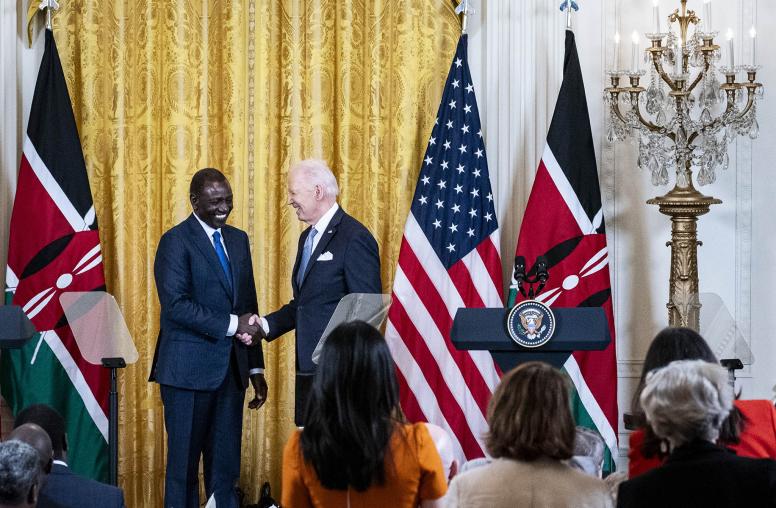On the Issues: Haiti's Youth
Vivienne O'Connor, USIP senior rule of law adviser, describes youth issues in Haiti and the outlook for children one year after the earthquake.
January 10, 2010
Vivienne O'Connor, USIP senior rule of law adviser, describes youth issues in Haiti and the outlook for children one year after the earthquake.
- As you look back on the past year since the Haiti earthquake, what are the major challenges the country now faces regarding the protection of children in Haiti?
- What has USIP been doing and what does USIP plan to do in the area of juvenile justice in Haiti?
As you look back on the past year since the Haiti earthquake, what are the major challenges the country now faces regarding the protection of children in Haiti?
The children of Haiti were already vulnerable before January 12, 2010. The challenges they faced were only exacerbated by the earthquake. Child trafficking, an ever-present phenomenon, became an even bigger problem in the wake of the earthquake. In the confusion that ensued and with children separated from their parents, an estimated 3,000 children were reportedly taken from camps and trafficked abroad to become domestic or sexual slaves. The Haiti “restavek” population (the name given to children sold by their parents to “restavek” or “stay with” a family who bought them for domestic servitude) faced a fate worse than that which they had been sold into. Thousands of restaveks were kicked out onto the streets after the earthquake to fend for themselves, becoming vulnerable to abuse and exploitation. They, like the other children of Haiti, face the threat of rape and sexual violence on a daily basis.
Since January 2010, children have also become increasingly more susceptible to recruitment by organized criminal gangs, including those gangs that escaped from prisons during the earthquake. When children are arrested for taking part in these or other crimes, they face extended pre-trial detention contrary to international human rights standards that require that detention of a child be “a last resort.” Moreover, children are held in prisons with adults, leaving them vulnerable to sexual abuse and criminal contamination. These are only two of the many human rights challenges that face the Haiti juvenile justice system.
What has USIP been doing and what does USIP plan to do in the area of juvenile justice in Haiti?
USIP has been providing assistance to Haiti since 2008, as it drafts a series of new criminal laws that will ensure that Haiti complies with its international human rights obligations and addresses serious crimes problems. Technical assistance has been provided by USIP’s Rule of Law Center of Innovation to Haiti lawmakers on both the substance and process of criminal law reform (See the Special Report, “Building the Rule of Law in Haiti: New Laws for a New Era”). Moreover, the USIP Model Codes for Post-Conflict Criminal Justice project, which developed a criminal law reform tool, has been used in Haiti as a source of inspiration in the drafting of new laws.
Included in USIP’s model codes, and in the proposed new Haitian Penal Code, are offenses against children, including child slavery, trafficking in children and the sale of children. All of these crimes are currently occurring in Haiti, as discussed above, but they are not classified as criminal offenses. This leaves the justice system relatively powerless to protect child victims. When the new criminal laws come into effect, the justice system will be able to fully address these heinous crimes against children.
In addition to protecting child victims of crime, a special Juvenile Justice Code is also being drafted that will focus on children who come into contact with the justice system because they have committed a crime. This initiative is a priority issue for the government of Haiti, as was mentioned in USIP’s Special Report, “Rule of Law in Haiti: After the Earthquake.”
The new Juvenile Justice Code will ensure that the rights of children who come into contact with the Haitian justice system are adequately protected and that their best interests are taken into account throughout the criminal process. The new Juvenile Justice Code will also have a strong emphasis on the rehabilitation of child offenders, rather than taking a purely punitive approach as under the existing law. USIP will provide ongoing assistance in this process. In the same way that the Model Codes for Post-Conflict Criminal Justice has provided inspiration to the drafters of the forthcoming penal code and criminal procedure code, the section of the Model Codes on juvenile justice will also prove a useful reference tool for the drafters of Haiti’s Juvenile Justice Code.
Explore Further
- Countries and Regions: Haiti
- USIP Project: Model Codes for Post-Conflict Criminal Justice
- Centers of Innovation: Rule of Law
- eNewsletter Sign Up: "USIP on Haiti"



